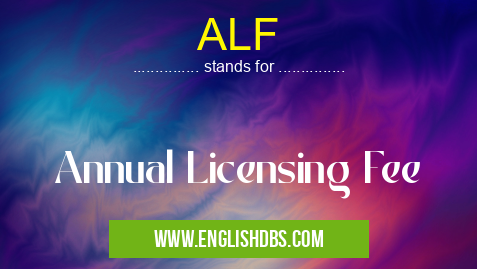What does ALF mean in GENERAL
Annual Licensing Fee (ALF) is an important concept in business and other commercial settings. It refers to the fee that an entity pays on an annual basis for the continued use of a particular product, service, or technology. The purpose of this fee is to ensure that the owner can enjoy their usage rights without worrying about any legal issues. ALF is common among software and intellectual property licensing agreements. To understand what ALF means and how it works, let us explore its features and implications further.

ALF meaning in General in Business
ALF mostly used in an acronym General in Category Business that means Annual Licensing Fee
Shorthand: ALF,
Full Form: Annual Licensing Fee
For more information of "Annual Licensing Fee", see the section below.
Meaning of Annual Licensing Fee
Annual Licensing Fee (ALF) is a fixed amount that one has to pay for a particular product, service or technology over a period of time – usually annually. It may be paid in one lump sum or through installments throughout the year to ensure the usage rights are respected and secured by both sides, with no potential legal ramifications arising from their agreement. Aside from ensuring compliance with terms set forth in a licensing agreement, ALF also covers fees associated with maintenance and operations. A portion of the fee may also go towards financial government regulations related to the particular product’s use or production process. Finally, ALF may even include royalties based on sales related to its distribution or implementation. Essentially, paying ALF allows companies to access services required for day-to-day operations while protecting rights owners from potential copyright infringement allegations or ownership disputes that could arise from its usage without permission.
Examples
Examples of products where Annual Licensing Fees are applicable include video games, web hosting services, software platforms such as Microsoft Office Suite, Adobe Creative Cloud Suite and many more. Generally speaking, entities using these products commercially will have to pay higher rates compared to personal users due to additional functionality needed for their business needs such as increased security protocols or additional cloud storage space for larger databases used during transactions etc. Also businesses which require multiple licenses are expected to pay lower per user compared when compared with individuals who have purchased separate licenses themselves separately because they would cost more as opposed to paying ALF which comes at discounted rates especially if multiple licenses were purchased together under the same agreement
Essential Questions and Answers on Annual Licensing Fee in "BUSINESS»GENERALBUS"
What is an Annual Licensing Fee?
The Annual Licensing Fee is a fee that must be paid by the licensee for the right to use intellectual property such as trademarks, copyrights, or patents. This fee must be paid every year in order to maintain the license.
What are the benefits of paying the Annual Licensing Fee?
By paying the Annual Licensing Fee, you will receive access to exclusive rights for utilizing the intellectual property owned by another individual or entity. Paying this fee also serves as proof of legal ownership and allows you to enforce your rights against any infringement.
How much does an Annual Licensing Fee typically cost?
The amount of an Annual Licensing Fee varies depending on several factors such as type of intellectual property, length of term and geographical scope. As a general rule of thumb, fees range from tens to thousands per year depending on the scope of usage and number of members involved.
Who is responsible for setting the amount for an Annual Licensing Fee?
Typically, it is up to the owner of the intellectual property to determine how much they wish to charge for licensing their work. This may be negotiated between both parties before finalizing a contract agreement.
Are there any penalties for not paying an Annual Licensing Fee?
Yes, there can be serious consequences for failing or refusing to pay an annual licensing fee. Depending on state laws and other factors, non-payment could result in termination of existing license agreements or even legal action taken against you by licensors.
Can I negotiate a payment plan if I'm unable to pay my entire annual licensing fee upfront?
Absolutely! Most licensors are willing to work out suitable payment plans with their licensees so long as all terms and conditions are agreed upon in writing beforehand.
Can I get a refund if I change my mind after making my payment?
Unfortunately refunds cannot typically be granted once payment has been made towards an annual licensing fee as these payments go towards covering protection costs associated with intellectual property rights.
Does paying an Annual Licensing Fee grant me full ownership over intellectual property?
No, simply paying this fee only grants you permission from the owner(s) to use their intellectual property under certain conditions outlined in contractual agreements between both parties. Full ownership lies solely with those who have copyrighted or patented said items.
Do I need to renew my annual licensing fee each year even if I haven't used my license during that time period?
Yes, even if you have not utilized your license during a given year it is still important that you renew your annual licensing fee prior to its expiration date or risk having your agreement terminated altogether by licensors should proper payments not be made within their specified timeframe(s).
Final Words:
In conclusion, Annual Licensing Fees serve an important role in business today as they not only help protect rights holders from unauthorized use but they also help cover operational costs associated with using these products and technologies. Additionally businesses buying multiple licenses benefit greatly since they get discounted rates when paying via ALF rather than buying individual licenses which takes away from clients’ efficiency as well as profitability margins.
ALF also stands for: |
|
| All stands for ALF |
